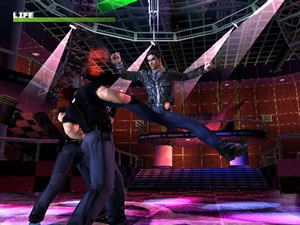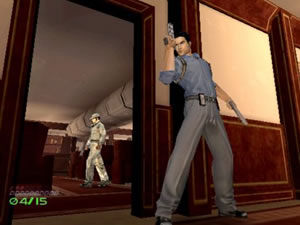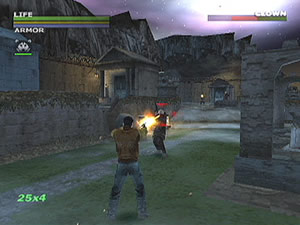Reborn, but not rebuilt.
Like a fine, wood-aged dessert
wine, a video game port should be sweet and savory. And when it comes out
literally a half-year later than the original, it should feature all kinds of
hidden flavors.
“What am I going on about?” you ask? Three words: Dead to Rights. While
I’m at it, here are three more words: Too Damn Repetitive. But at least you
get to kill bad guys, and lots of ’em, which brings us to the last three words:
Now On PS2!
Dead
to Rights made some waves at E3 this year thanks to its cinematic action
and brutal gunfights. Indeed, Namco’s latest hard-boiled action romp is heavily
steeped in Max Payne / Matrix / John Woo
flavor. Unfortunately, this port of the
Xbox version offers very little new and suffers the same arcadey fate as
its hard boiled predecessor.
You play K-9 police officer Jack Slate. On his first mission, Jack finds a
near and dear family member lying in a pool of their own blood, shot to death.
Against the better judgment of his superiors, Jack begins a one-man mission
to find his father’s killer. Though it seems straightforward enough, the story
is easily one of the more interesting elements in Dead to Rights. It
begins simple and builds gradually with some nice twists and turns. Suffice
to say, the responsible party isn’t always the most obvious.
Dead to Rights borrows heavily from Hong Kong gangster movies, Syphon
Filter, Metal Gear
and most notably our resident Bullet-time favorite Max Payne, allowing
players a number ways to dish out their own blend of justice. Essentially, you
take Jack through over a dozen missions where you must shoot wave after wave
of baddies and loot their bodies to find the key or pass card to the next room
filled with more of the same. The game even throws in a number of mini games,
like defusing things, picking locks and even weightlifting. They get increasingly
more difficult as the game progresses, but for the most part they’re just filler.
The fighting is where the game is at its best. You can run and gun two-fisted,
use a few cinematic kung-fu moves to disarm an enemy or grab another guy and
use him as a human shield while returning fire. They even threw in all the shoot-dive
jumping maneuvers you remember from Max Payne, although here the moves
are stiffened and don’t flow as naturally.
Many of the attacks and defensive moves can be viewed in slow-motion if your
‘adrenaline meter’ permits. The meter builds over time but can be more quickly
replenished by performing cooler, more intense moves like disarming, taking
a human shield or throwing an opponent. It also makes the game look a lot cooler.
But you’ll rarely use the slow-mo since it’s cheaply implemented and doesn’t
add anything at all to the game. Max Payne raised this bar pretty high,
and Dead to Rights struggles to clear it.
Jack has another mode of combat – fisticuffs. At any time (and often against your behest) you may find yourself unarmed. Jack doesn’t seem to believe in reloading. Instead, he just fires what’s in the clip and then discards the damn thing. This is a little annoying and a disappointment for those who appreciate reload animations. I guess the developers wanted to force you to disarm assailants in order to quickly gain adrenaline and perform the slow-motion moves.
In any event, the hand-to-hand is put together not unlike a true 3D fighting
game. You are offered Virtual Fighter-style control with the ubiquitous
punch, kick and throw trio. This allows for a number of cool combinations. You
can even dodge and break throws. It’s pretty sweet and at times will have you
giggling after a particularly brutal sequence.
But repetitive gameplay is no laughing matter, and Dead to Rights doesn’t
hesitate to throw endless waves of enemies at you. This is cool for nonstop
fighting, but that’s really all you have here. Even the mini-puzzles don’t provide
enough alternate gameplay to really distinguish this from being just another
shooter with cool fighting elements.
 Plus,
Plus,
all those fighting elements come at a price. The mastery of the control rests
on top of steep learning curve. You can jump on quickly and kill guys, but fully
taking advantage of disarming, human shielding and the like will take time and
practice.
Yet unlike the Xbox version, Dead to Rights on the PS2 comes with 3
difficulty settings, none of which are as massively challenging as the one difficulty
option on the Xbox. This makes your first pass much smoother, but less rewarding.
Sadly, things aren’t helped by the camera. You move Jack around the world
with the left analog stick and the camera rotates with the right analog stick.
It doesn’t bother trying to keep up with you. Instead, auto-targeting with R1
is the easiest way for Jack to keep his eyes on the action. But Jack doesn’t
target the closest enemy by a long shot. In fact, you can press R1 and Jack
will aim at a guy yards away while another gunman is shooting him point blank
in the side of the head.
Despite its lengthy development time (it was originally supposed to be a PSOne
game) and original stint on the Xbox, Dead to Rights hits an even rougher
spot in its graphics than its Xbox sibling. Incredibly flat textures with few
colors decorate the game world. True to Namco form, this one’s so arcadey it’s
shocking. There are icons, targeting arrows and beacons all over the place.
I thought I was at Chuck E. Cheese playing some new Virtua Cop game.
It totally kills whatever film noir mood they were going for.
And what often can kill a good action flick has turned up to squeeze some
life out of Dead to Rights – a bad actor. Jack is your garden-variety
know-it-all wise-crackin’ bad-ass, but without all the charisma and cool one-liners
we’ve come to expect. This makes Jack more of an annoyance than someone you
want to help right wrongs.
His dialogue is obviously meant to emulate the traditionally stoic flair of
noir pulp detective stories, but the result is dry and bland. The voice talent
could have used more “talented” actors and actresses, unless 80’s T.V. shows
like Hunter
or even Sledgehammer are what
you’re going for.
Dead to Rights is all over the place. Someone had a good idea and great
reference material, but the end product is repetitive and lackluster. There
are definitely enough exciting action sequences in here to make the game a worthy
rental, but for fifty bucks you’re better off picking up a used copy of Max
Payne for your pulp noir or Devil May Cry
for your stylish action.

-
Nice story
-
Cool action...
-
...over and over again.
-
Camera/control issues
-
Uneven graphics
-
Poor targeting system







